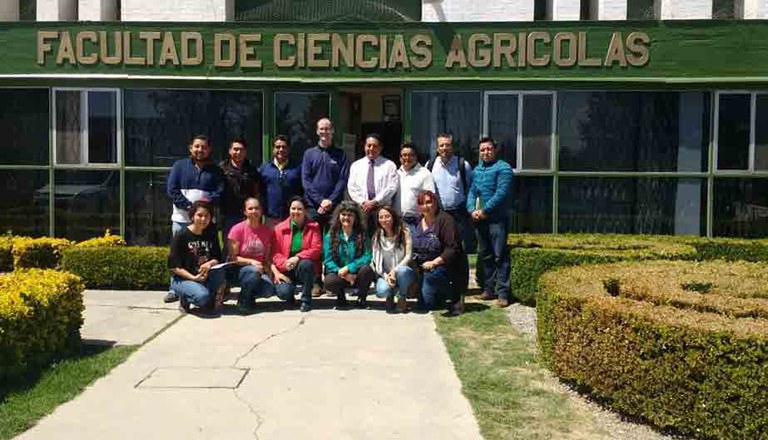Posted: March 12, 2018
From February 26 through March 2, Dr. Paul Esker had the opportunity to visit the Autonomous University of Mexico State (la Universidad Autónoma del Estado de México, UAEM), where he presented an invited talk in the graduate seminar series, as well as a week-long workshop on agricultural epidemiology.

Some of the participants in the Agricultural Epidemiology workshop taught by Paul Esker at the Autonomous University of Mexico State
Overall, it was a great visit thanks to his local host, Dr. Jesús Ricardo Sánchez Pale, as well as the Faculty of Agricultural Sciences, who for provided financial support for the visit. He was treated exceptionally well.
On the first day of the visit, after an introductory session to the workshop (more details to follow), Dr. Esker presented a seminar as part of the graduate student seminar series titled, "Estudio retrospectivo sobre el impacto de las enfermedades de la soya en los EUA" (Retrospective study about the impact of soybean diseases in the USA). Attendance was very good and included both students and professors. The students asked lots of high quality questions, which led to the seminar lasting almost 1.5 hours!
The Agricultural Epidemiology workshop focused on integrating theoretical concepts in plant disease epidemiology with practical and illustrative examples using R (https://www.r-project.org/) and RStudio (https://www.rstudio.com). Participants in the workshop ranged from students working towards the Licenciatura title (first degree), to graduate students (MS and PhD) and professors. While the majority of the participants had limited experience with R, they quickly showed an ability to work with the software. Overall, the following themes were covered during the week: (1) history and importance of epidemiology, (2) methods to evaluate and estimate diseases, (3) introduction to statistical analysis for epidemiological data, (4) disease progress over time, (5) spatial processes, (6) sampling, and (7) importance of plant diseases in ecosystem services. There was also time on the last day for an open discussion to explore future research and educational opportunities between the two institutions.
On top of the workshop and talk, Dr. Esker had the opportunity to discuss additional opportunities for collaboration, ranging from the development of another workshop related to statistical modeling for the agricultural sciences, to collaborative projects to further our understanding of the impact of rust diseases on major crops in Mexico and the region, and finally discussions focused on how best to develop student exchanges. These discussions involved not only Dr. Esker's colleagues at UAEM, but also colleagues at the Colegio de Posgraduados and the Autonomous University of Chapingo (la Universidad Autónoma Chapingo). It was a very productive trip and we can look forward to interesting outcomes from these collaborative opportunities!

